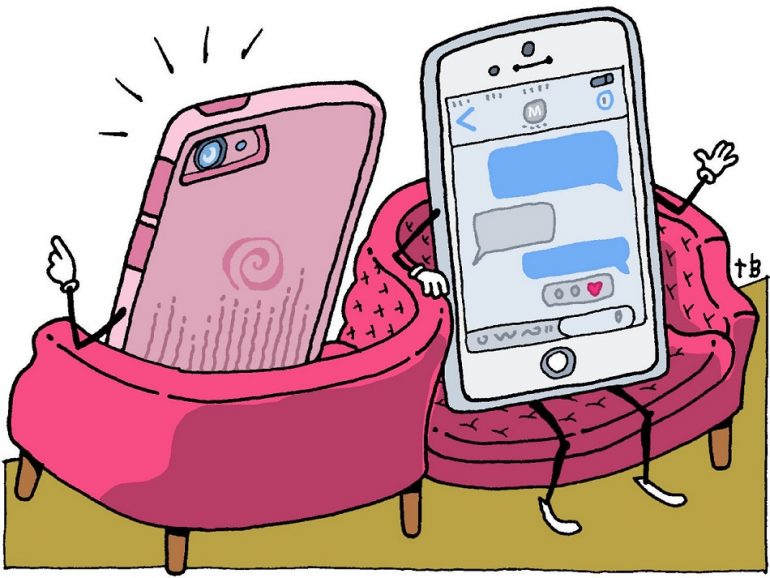Source: https://www.nytimes.com/2016/10/30/style/smartphones-iphone-marriage-husbands-wives-technology.html
By Brooke Lea Foster, Oct. 28, 2016
Sherry Zheng was cleaning up from dinner, ready to toss out the remaining fried rice, when she grabbed her phone from the counter to text her husband, Chris. He was upstairs bathing their three children. “Should I save you the leftovers?”
Her phone vibrated: “Sure.”
Ms. Zheng, a 37-year-old stay-at-home mother in Oakton, Va., describes her marriage as happy, and she’s thankful for those kinds of small conveniences that her smartphone affords her. But like most couples, there are also times, when her husband pecks away at a screen, that she wants to toss his device away with the table scraps.
Just the other day, Ms. Zheng was talking to her husband about their plans for the weekend, and when he didn’t respond, she realized he was buried in his phone answering a work email. She tried again, and when he failed to even look up, she lost her temper — something she rarely does.
“Can’t you just acknowledge me?” she hollered. “I’m standing right here.” Mr. Zheng promptly placed his phone on the table. (Since then, she has made her point a bit more clearly by texting him her questions, even if they’re in the same room since she knows she’ll get a response.)
We live in a culture of dings, beeps, and buzzes, as most people manage everything from bank accounts to fantasy football teams on their smartphones.
Spouses may pout if their partners don’t “like” their every Facebook post, an expectation, for some, of marital boosting. Pull out your device to check the baseball scores while on a date with your wife, and you’re bound to get an eye roll.
Type an actress’s name into IMDb while watching TV and suddenly you’re on a 10-minute bender into the black hole of your screen, distracted by a text or game notification. “Are you even watching?” your husband snaps.
Married or not, many of us sleep with our phones on our nightstands, pocket them as we go from room to room and think nothing of using them in the presence of our partners, whether they are talking or snuggling or reading beside us.
Experts say that smartphone use is meddling in our marriages in ways that are sometimes benign but often frustrating, causing quarrels and forcing couples to address an even more important question: At what point are we choosing to spend more time with our smartphones than with our spouses?
Many couples work hard to reduce their screen time while around their children; several couples interviewed said they have a policy of no phones at the dinner table.
Elizabeth Sciupac, 31, a research associate at a think tank in Washington, said she realized one night that she and her husband, Ivan, 41, were at the same table but worlds apart.
“We’d been at work all day, and instead of talking to each other, we’d be looking down at our screens,” she said. “We were like: ‘We can’t keep doing this. We’re not even having a conversation.’”
They’ve tried to enforce the no-smartphone rule on dinner tables most of the time, but when their 2-year-old goes to sleep, they engage in a bit of a screentime free-for-all.
“We definitely have things that bug each other,” Mr. Sciupac said. “I can’t stand when we’re watching a TV show and she’s on Candy Crush because she’s not actually paying attention, but she insists she is.”
Dr. Sameer Sheth, 40, is a neurosurgeon who lives in Scarsdale, N.Y., with his wife, Sarita Sheth, 39, and their two children (who are in elementary school). He is inclined to catch up on work emails as soon as his family is busy with an activity; it’s the nature of his job, he said.
Ms. Sheth, who admits that she is guilty of pulling out her phone during family dinners, said that the sight of her husband answering emails on a Saturday morning can make her hair stand up because it feels as if he’s bowing out of the day.
“Isn’t there something you could do around the house? Aren’t there any light bulbs that need fixing?” she’ll say. When asked why it bothers her, she doesn’t hesitate: “Because when he’s home, it’s our time. I want him to be here.” And by that, she means mentally, not just physically.
Marital therapists say the feeling of vying with a smartphone for your partner’s attention isn’t unique, especially because of just how often we’re looking down, rather than up.
“It says to your partner, ‘you’re less important than my phone,’” said Rhonda Milrad, a marriage counselor in Beverly Hills, Calif., and founder and chief relationship advisor at Relationup, an online, on-demand relationship advice app. Even mere seconds on a smartphone to check the weather or scan movie times can add up negatively in the eyes of a spouse.
While there isn’t a clear correlation between screentime and marital dissatisfaction, a 2014 Pew Research report, “Couples, the Internet and Social Media,” polled 2,250 adults to gauge how relationships are weathering technology.
While 72 percent of adult internet users reported that the internet has had “no real impact at all” on their marriage, of those that did see an impact, 20 percent said it was mostly negative. A quarter of respondents said that partners were distracted by their cellphone when they were together. But therapists say it’s not that smartphone use leads to divorce, just that it strains existing tensions.
Steve Brody, a psychologist, said he often hears this refrain in his therapy practice in Cambria, Calif.: “My husband spends too much time on his phone.”
While men and women are equally tethered to their devices, it seems, anecdotally at least, as if women may be more sensitive to the rejection felt when a spouse looks at his phone than a husband is.
“Women immediately think, ‘He doesn’t want to be with me,’” Dr. Brody said. “It gives them a sense of separateness.”
He chuckles at the thought that even he and his wife, Cathy Brody, who is also a marriage and family therapist, have struggled with each other’s screen time. (For them, laptops are the issue; they don’t get smartphone service at home in the mountains.)
While Dr. Brody likes to stay up reading the news and checking email, his wife thought it was crucial that they go to bed at the same time. “It was hard for me to give that up,” he said, “but she’s right: It’s an important time to spend together.”
If couples don’t actually speak to each other before bedtime, they’re unlikely to crawl into bed anywhere close to being in the mood. Call it verbal foreplay, said Susan Heitler, a Denver clinical psychologist and relationship coach.
For women, a great conversation with your partner is a turn-on, since it makes you feel emotionally close. But men are often turned on by visual signals. This can be a problem when both people are buried in a screen, she said.
“The things that build intimacy are physical cues like eye-to-eye contact, laughing at each other, smiling,” said Dr. Heitler, who also wrote “Prescription Without Pills: For Relief From Depression, Anger, Anxiety and More”; one chapter addresses technology addiction. “When people come in and say they’ve grown apart, this is one way it happens. They’re tuned into their devices rather than each other.”
Smartphones may be particularly disruptive if both partners are on their phones in bed.
Therapists say that when a marriage hits a rocky patch, they’ve seen one or both partners hide behind their phones. Dr. Heitler said that one of her clients feared his wife was attracted to her flirtatious boss; rather than address it, he grew depressed and spent more and more time gaming on his smartphone.
“It distracted him, but it didn’t fix the problem,” she said. “I worked with them on learning how to talk to each other again. I think that’s getting lost in relationships today.”
And when Dr. Jamie Borin, a urologist in Manhattan, awakes from a good night’s sleep and rolls over to chat with his wife, Dr. Stacy Loeb, also a urologist, she’s often on her phone.
“It helps me wake up,” she said, noting she spends some of her free time on Twitter. When she begins texting her husband at the end of the day about dinner plans (“Fifteen texts may come through: What should we eat? Take in or eat out? What neighborhood?”), he often just picks up the phone to call her.
“I don’t have the patience for that kind of back and forth,” he said. They chalk it up to age differences: he is 45, she is 36.
Dr. Borin said, “I’d just rather talk.”








